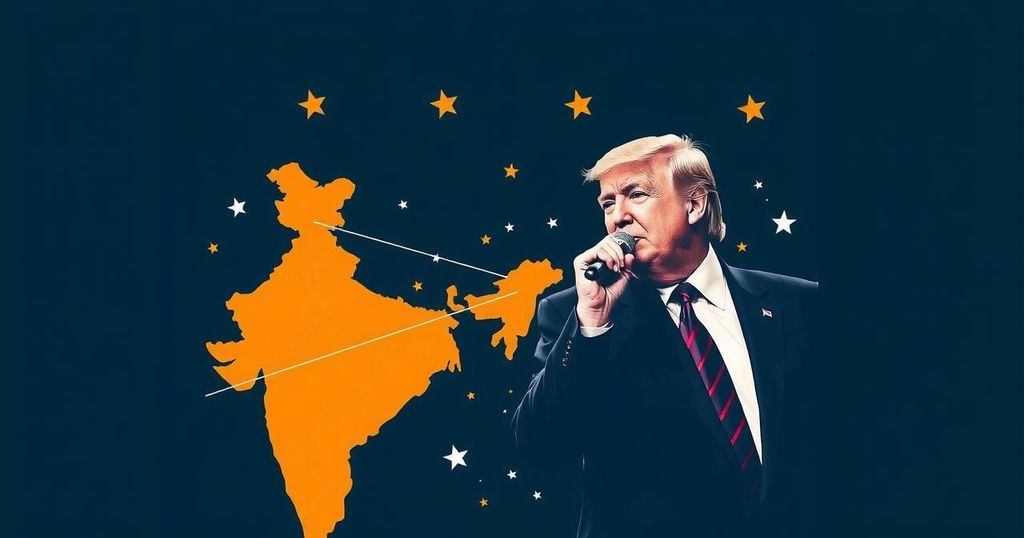Will Trump’s Re-election Impact Indian Start-Ups?

Donald Trump’s reelection as President of the USA raises questions about the impact on Indian start-ups, particularly regarding U.S. investments. Past funding trends indicate a peak during Trump’s earlier term, while Biden’s administration saw a gradual decline in funding rounds. Optimism persists among some industry leaders about future investments under Trump, though concerns about immigration and trade policies loom large. The start-up sector must navigate these complexities to sustain growth moving forward.
With Donald Trump returning as the 47th President of the United States, global reactions are burgeoning as people ponder the implications for various sectors, particularly for Indian start-ups. His previous presidency from 2017 to 2021 saw significant investment flows from the United States to India’s start-up ecosystem, with $10.2 billion recorded in 2017 and $9 billion in 2020. Funding rounds also increased notably, rising from 413 in 2017 to 711 in 2020. While the current trajectory reveals a decrease in funding rounds amidst President Joe Biden’s administration, optimism remains about Trump’s policies reigniting investment flows towards Indian start-ups. During Biden’s tenure, the Indian start-up ecosystem received a total of $33.6 billion from 2021 to 2023, with a deteriorating trend into 2024 where funding reached only $5.8 billion thus far. The count of funding rounds surged to 1136 in 2021 but has since declined to 313 by November 2024. The inflation of funding in 2021 has been attributed to the supportive monetary policies in the US, including near-zero interest rates. Industry leaders like Somdutta Singh, founder of Assiduus, have expressed optimism about Trump’s pro-start-up policies likely attracting renewed investment into Indian ventures. However, others are reticent, noting that stringent immigration policies could hinder the ability of Indian start-ups to attract skilled foreign professionals. Trump’s hard stance on immigration, notably his intention to enforce stricter H-1B visa regulations, is viewed as a risk. Yasin Hamidani of Media Care Brand Solutions stated, “Funding for start-ups may become more cautious, with investors potentially wary of policy changes affecting international trade, immigration, or taxes.” Trade policies could further ripple through the start-up scene; Trump’s promise to enforce high tariffs on Chinese goods poses risks, particularly if those tariffs create a competitive advantage for Indian companies halting collaborative opportunities. Moreover, Trump’s stance on sustainability and environmental issues raises concerns, as past actions included the rollback of numerous environmental protections. Despite these apprehensions, some experts hold a positive view, indicating that India’s robust pool of talent and entrepreneurship could still yield growth within its ecosystem. The consensus among some analysts remains that Trump’s presidency could fortify India’s economic standing, especially if anti-China strategies are pursued, benefitting Indian exporters. Elara Capital emphasizes a broadly positive outlook for India, particularly in the shipping and manufacturing sectors, as their report indicates this would provide critical backing amidst shifting global dynamics.
The article examines the potential effects of Donald Trump’s re-election on the Indian start-up ecosystem, particularly in terms of investment from the United States. It reviews historical funding data from Trump’s previous presidency and contrasts it with investments during President Biden’s administration. The perspectives gathered from industry leaders provide insights into how new immigration policies, tariffs, and sustainability concerns could shape future operations and funding landscapes for Indian start-ups. The diversity of opinions illustrates a complex backdrop of optimism shadowed by caution regarding the upcoming political climate.
In conclusion, Trump’s return to power presents a mixed bag for the Indian start-up ecosystem. While there is potential for increased investment driven by his pro-business policies, uncertainties around immigration, trade tariffs, and environmental regulations may impose significant challenges. The ultimate impact will depend on how Indian start-ups adapt to the evolving regulatory atmosphere and leverage their strengths in talent and innovation to navigate a potentially tumultuous economic landscape.
Original Source: www.outlookbusiness.com








